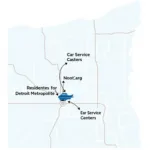Maintaining your car through regular servicing is crucial for its longevity, safety, and performance. But what exactly happens during a car service? This comprehensive guide delves into the details of what a car service entails, ensuring you understand the importance of each step.
Understanding Car Service: More Than Just an Oil Change
While an oil change is a vital part of car service, it’s just one piece of the puzzle. A car service encompasses a series of checks, adjustments, and replacements aimed at keeping your vehicle in optimal condition. Think of it as a health checkup for your car.
Key Components of a Car Service
The specific tasks performed during a car service can vary depending on the vehicle’s make, model, age, mileage, and the type of service required. However, some standard procedures apply to most vehicles.
1. Fluid Level Checks and Top-Ups
Engine Oil: The lifeblood of your engine, ensuring smooth operation and preventing excessive wear and tear. During a service, the mechanic will drain the old oil and replace it with fresh oil, along with a new oil filter.
Coolant: Regulates engine temperature, preventing overheating. The mechanic will check its level and condition, topping it up or flushing the system if needed.
Brake Fluid: Essential for the braking system’s proper functioning. The mechanic will inspect the fluid level and condition, topping it up or recommending a flush if necessary.
Power Steering Fluid: Ensures smooth steering operation. The mechanic will check the fluid level and condition.
Windshield Washer Fluid: Provides clear visibility during inclement weather. The mechanic will top up the fluid.
2. Filter Replacements
Oil Filter: Traps contaminants and debris in the engine oil, preventing them from damaging the engine. This filter is replaced at every service.
Air Filter: Prevents dust, dirt, and debris from entering the engine, ensuring optimal air intake for combustion.
Cabin Air Filter: Cleans the air entering the passenger cabin, removing pollen, dust, and other allergens.
 Different Types of Car Filters
Different Types of Car Filters
3. Visual Inspections
Belts and Hoses: Checking for cracks, wear and tear, ensuring they are in good condition and properly tensioned.
Lights: Verifying all exterior and interior lights are functioning correctly.
Tires: Inspecting tire pressure, tread depth, and overall condition, including the spare tire.
Brakes: Examining brake pads and discs for wear and tear, assessing brake fluid condition, and checking for leaks.
Exhaust System: Inspecting for leaks, damage, and proper functioning.
Battery: Checking the battery’s charge, terminals, and overall condition.
Steering and Suspension: Inspecting for wear and tear, ensuring smooth and safe handling.
4. Additional Checks and Services
Spark Plugs: Responsible for igniting the air-fuel mixture in the engine cylinders. They may need replacement based on their condition and the vehicle’s service schedule.
Fuel System: Checking for leaks, inspecting fuel lines, and potentially recommending a fuel system cleaning.
Transmission Fluid: Ensuring the transmission operates smoothly. This fluid may require replacement based on the vehicle’s service schedule.
Computer Diagnostics: Connecting a diagnostic tool to the vehicle’s onboard computer to check for error codes and potential issues.
Types of Car Services
Car services are generally categorized based on the extent of the inspection and maintenance required. Common types include:
- Interim Service: A basic service typically recommended every 6 months or 6,000 miles.
- Full Service: A comprehensive service covering a wider range of checks and replacements, generally recommended annually or every 12,000 miles.
- Major Service: The most extensive service, including all aspects of a full service plus additional checks and replacements for major components, typically recommended every 24,000 miles or as per the manufacturer’s guidelines.
It’s essential to consult your owner’s manual or a trusted mechanic to determine the appropriate service schedule for your specific vehicle.
Benefits of Regular Car Service
- Improved Safety: Regular checks and maintenance ensure all safety-critical components are in optimal condition, reducing the risk of accidents.
- Enhanced Performance: A well-maintained car runs smoother, offers better fuel efficiency, and delivers optimal performance.
- Increased Lifespan: Regular servicing can significantly extend the life of your vehicle, saving you money on costly repairs in the long run.
- Higher Resale Value: A well-maintained car with a comprehensive service history commands a higher resale value.
- Peace of Mind: Knowing your car is in top condition provides peace of mind and worry-free driving.
Conclusion
Understanding “what is done during car service” empowers you to make informed decisions about your vehicle’s maintenance. Regular car servicing is not just an expense; it’s an investment in your safety, your car’s longevity, and your peace of mind.


